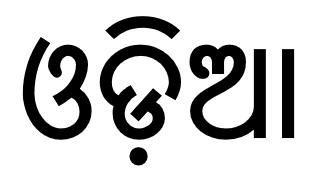
Odia is an Indo-Aryan language spoken in the Indian state of Odisha. It is the official language in Odisha, where native speakers make up 82% of the population, and it is also spoken in parts of West Bengal, Jharkhand, Andhra Pradesh and Chhattisgarh. Odia is one of the many official languages of India; it is the official language of Odisha and the second official language of Jharkhand. The language is also spoken by a sizeable population of 700,000 people in Chhattisgarh.

Akshaya Mohanty, also known as Khoka Bhai, was an Indian singer, lyricist, composer, musician and writer in Odia. He has contributed Odia bhajans, Odissi songs, folk songs, film and non-film modern light songs in Odisha on contemporary themes and ballads based on popular legends in Odisha.
Odia literature is literature written in the Odia language, mostly from the Indian state of Odisha. The modern Odia language is mostly formed from Tadbhava words with significant Sanskrit (Tatsama) influences, along with loanwords from Desaja, English, Hindustani (Hindi/Urdu), Persian, and Arabic. Its earliest written texts date from around 1000 CE. The earliest Odia newspaper was Utkala Deepika, first published on August 4, 1866.

The Odia film industry, colloquially known as Ollywood, is the Odia language Indian film industry, based in Bhubaneshwar and Cuttack in Odisha, India. The name Ollywood is a portmanteau of the words Odia and Hollywood.
Matira Manisha is a 1966 Odia film directed by Mrinal Sen.

Jai Jagannatha is a 2007 Indian Hindu mythological film directed by Sabyasachi Mohapatra, released in 15 languages. Besides Odia and Hindi, it's dubbed versions were released in English, Bengali, Assamese, Chhattisgarhi, Bhojpuri, Rajasthani, Punjabi, Gujarati, Marathi, Telugu, Tamil, Malayalam and Nepali languages.

Rangin Jajabara is a 1975 Odia language Indian movie. The music was composed by Akshya Mohanty. It was produced by Bijay Pattnaik, directed by Akshaya Mohanty, Hemanta Das and Bijay Mishra (Trimurty). It stars Sriram Panda, Banaja Mohanty and Tripura Mishra. Jajabar was the first black-and-white film in Odia to be digitally colourised and re-released in the state.
Shree Shree Mahalaxmi Puja is a 1959 Indian Odia mythological film directed by Biswanath Nayak. This is debut film of Sarat Pujari. The tale of Goddess Laxmi leaving the temple to teach brothers Lord Jagannath and Lord Balabhadra, a lesson, was presented in the movie.
The Odisha State Film Awards have been conferred by the Department of Culture of the Government of Odisha, India.
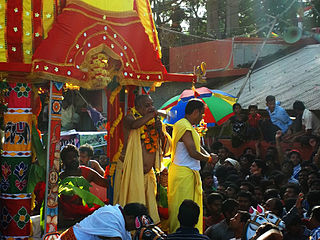
Dahuka boli are poetic recitations which Dahukas, the charioteer who recite during the Rath Yatra in Puri, Odisha. Ratha Yatra being a symbolic expression of fertility and Life cycle, these "boli" sung by the Dahuka contain bawdy songs. It is believed that unless the Dahuka boli is sung 'Ratha' doesn't move. These songs are sung publicly without any kind of hold on the lyrics. Dahuka controls the movement of Ratha during the festival. This tradition is the remnant of Vajrayana Buddhism in Odisha and the lyrics bear the signature of the Vajrayana Buddhist poetry. The Dahukas are believed to be the descends of the famous 84 Mahasiddhas.
Kie Kahara (1968) is an Odia film directed by Nitai Palit. The film reflects the socio-economic conflicts of the declining Zamindar families, which were struggling to keep up social status with great difficulty.
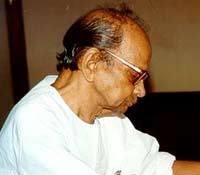
Gopal Chhotray (1916–2003) was born in Puranagarh village of Jagatsinghpur district in Bihar and Orissa Province, India.

Raja Jhia Sange Heigala Bhaba is an Oriya drama and romance film released on 10 June 2012. Starring Arindam Roy, Archita Sahu and Mihir Das in key roles. veteran actress Mahasweta Roy being enacted the role of mother of Arindam Roy and Mihir Das played the role of father of Archita Sahu. The film is about strategic love dilemma of a rich girl with a poor boy. Arindam Roy was selected to play the lead role.
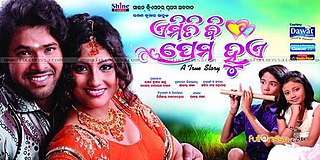
Emiti Bi Prema Hue is a 2012 Oriya romantic drama film directed by Nishikant Dalabehera. Sabyasachi Mishra, Riya Dey and Mihir Das played the lead cast. The film released on 10 February 2012.
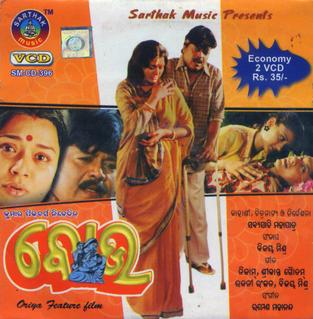
Bou is a 1998 Indian Odia-language drama film. It was directed, produced and written by Sabyasachi Mohapatra. Usasi Misra, Jyoti Misra and Akshaya Bastia debuted in the film.
Kaa is a 1965 Oriya film directed by Siddhartha, which is a pseudonym for Gour Prasad Ghose, Parbati Ghose, & Ram Chandra Thakur. The film is based on Kanhu Charan Mohanty's award-winning literary masterpiece in the same name. The Film glorifies the story of a barren woman, who induced her husband to marry another woman for the sake of the birth of a child.

Stree is a 1968 Oriya film directed by "Siddhartha", which is a pseudonym for Gour Prasad Ghose, Parbati Ghose, & Ram Chandra Thakur.
Indradhanura Chhai is a 1993 Indian Oriya film directed by Susant Misra. This film reflects the traditional structures of social and family life of a small town in India are growing strongly affected by the progressive urbanization of the country. Three generations of women see their perception of human nature to evolve, as their personal relationships. In their loneliness, they face problems of tradition, culture, religion and manage gender relations. Gradual urbanization and its consequences affect the traditional, social and family structures in a growing small town in India. The story explores the multidimensional conflicts of three women of different generations, their changing perceptions about human nature and personal relationships. Their lonely moments are highlighted in the context of the inexorable flow of time amidst issues of tradition, culture, religion and man-woman relationships.
Nirmala Mishra was an Indian singer of predominantly Bengali and Odia film songs. She also sang popular Assamese songs, most notably "Ki Naam di Matin". She was a recipient of the Sangeet Sudhakar Balakrushna Das Award as an honour for her lifetime contribution to Odia music.











